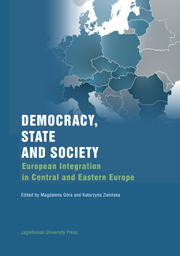Book contents
- Frontmatter
- Contents
- List of contributors
- Europeanisation in the EU New Member States. Aspects and Research Agendas
- Part one Democracy after Enlargement
- Part two Identity Transformations
- The Identity of Europeans after the EU Enlargement
- Peripheries and Borders in a Post-Western Europe
- Between Reconciliation and the Reactivation of Past Conflicts in Europe: Rethinking Social Memory Paradigms
- How Different is the “New Europe”? Perspectives on States and Minorities
- Part three Civil Society Organisations in Central and Eastern Europe
- Part four Europeanisation of International Relations
- Index
Peripheries and Borders in a Post-Western Europe
from Part two - Identity Transformations
Published online by Cambridge University Press: 05 September 2014
- Frontmatter
- Contents
- List of contributors
- Europeanisation in the EU New Member States. Aspects and Research Agendas
- Part one Democracy after Enlargement
- Part two Identity Transformations
- The Identity of Europeans after the EU Enlargement
- Peripheries and Borders in a Post-Western Europe
- Between Reconciliation and the Reactivation of Past Conflicts in Europe: Rethinking Social Memory Paradigms
- How Different is the “New Europe”? Perspectives on States and Minorities
- Part three Civil Society Organisations in Central and Eastern Europe
- Part four Europeanisation of International Relations
- Index
Summary
Abstract: This article explores the concept of borderlands with respect to conceptions of Europe and current developments in European societies, especially in the context of the recent enlargement of the EU. It examines the changing nature of borders with a view towards offering an assessment of the notion of a post-Western Europe. The thesis advanced in the paper is that Europe is taking not just a post-national form, but is also taking a post-Western shape and this latter dimension may be more significant. An important aspect of this is changing relations of peripheries to the core. The aim of the paper is to offer a new assessment of the periphery which can be seen as a zone of re-bordering. In the periphery the relation between the inside and the outside is complex and ambivalent; while often taking exclusionary forms, this is a relation that can also be viewed as the site of cosmopolitan forms of negotiation.
Introduction
The enlargement of the European Union has brought about a significant change in the shape of Europe as a geopolitical entity. The significance of the eastern enlargement process goes beyond the institutional question of the membership and constitution of the EU and suggests a major reorientation in the identity of Europe. Unlike earlier enlargements of the EU, the recent enlargement processes have wider cultural implications.
- Type
- Chapter
- Information
- Democracy, State and SocietyEuropean Integration in Central and Eastern Europe, pp. 113 - 126Publisher: Jagiellonian University PressPrint publication year: 2011



